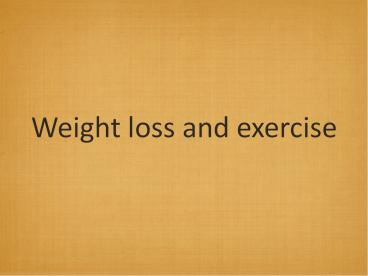Weight loss and exercise - PowerPoint PPT Presentation
Title:
Weight loss and exercise
Description:
1-2 lbs of weight loss per week. Reducing Caloric Intake. Reducing Calorie Intake ... Successful Weight Loss. diet and exercise ... – PowerPoint PPT presentation
Number of Views:1510
Avg rating:3.0/5.0
Title: Weight loss and exercise
1
Weight loss and exercise
2
Obesity
- Overweight BMI 25.0 - 29.99
- Obesity
- BMI 30
- Body fat gt 25 for men
- Body fat gt 30 for women
- Americans
- Overweight 32
- Obese 34
3
(No Transcript)
4
Obesity
- Genetic factors
- 25 of the transmissible variance for fat mass
and percent body fat - Cultural factors (30)
- Individual choices (45)
5
Calorie
- A measure of HEAT
- (1 calorie heat required to raise 1 gram of
water by 1 degree Celcius in temperature) - Heat, or Calorie, represents Energy
6
Weight Loss
- Caloric balance or imbalance
- Energy In gt Energy Out Weight Gain
- Energy In lt Energy Out Weight Loss
- Examples
- Energy In Big Mac 540 kcal
- Energy Out Run 40 minutes
7
Energy Out
- Caloric expenditure
- Resting Metabolic Rate 60-75
- Thermic effect of food 10
- Physical activity 15-30 of daily caloric
expenditure - Example 3000 calories in one day
- RMR 1,800-2250 kcal
- TEF 300 kcal
- PA 450-900 kcal
8
Energy In
- Fat 9 calories per gram
- Alcohol 7 calories per gram
- Carbohydrate 4 calories per gram
- Protein 4 calories per gram
9
Weight Loss
- Reduce Energy In and/or Increase Energy
Out... - 500-1000 fewer calories per day
- (3,500-7,000 fewer calories per week)
- Recommendations
- 1-2 lbs of weight loss per week
10
Reducing Caloric Intake
11
Reducing Calorie Intake
12
Rapid Weight Loss / Low Calorie Diets
- weight loss greater than 1-2 pounds per week.
- Where does the weight loss come from?
- Water loss, Muscle loss, etc.
- Metabolic rate?
13
Caloric Intake and Resting Metabolic Rate
14
Metabolic Rate
- Resting Metabolic Rate is VO2 measured at rest
- ave. resting VO2 3.5 ml/kg/min
- Estimated RMR 1 kcal/kg/hour
- For a 183 pound person, RMR 2000 kcals.
- 60-75 of daily caloric expenditure
15
Metabolic Rate
- Genetics
- Gender
- Fat-free mass
- Dieting
- Hormones (e.g. Thyroid hormones, etc)
- Over eating (thermogenesis)
- Medications/Drugs
16
Increasing Caloric Expenditure
17
Physical Activity and Body Fat
18
Exercise and Weight Loss
- Exercise alone
- less effective than diet alone
- Duration
- gt 2000 calories/wk
- EXAMPLES OF KCAL expenditure
- 0.77 kcal / kg / mile for walking
- 1.53 kcal / kg/ mile for running
19
Exercise and Weight Loss
- Exercise may be most critical to help maintain
weight loss - Exercise helps to maintain muscle mass and
metabolic rate
20
Exercise and Weight Loss
- Aerobic exercise v Resistance exercise
- WORKOUT CALORIES
- resting metabolic rate
- Aerobic Exercise Duration versus Intensity
21
Fat Burning Zone?
22
Exercise and Fat Metabolism
- Is low-intensity exercise best for burning fat?
A Closer Look 4.3
23
Successful Weight Loss
- diet and exercise
- Diet limited caloric intake (source of calories
is unimportant) - Exercise increase physical activity
24
Weight Gain
- Genetics
- Body Type / Somatotype
25
Weight Gain
- Caloric intake greater than caloric expenditure.
- 25-30 calories per pound of body weight to gain
weight (20 calories per pound to maintain weight) - ...or...
- 500-1000 extra calories per day.
26
Weight Gain
- Caloric distribution
- Carbohydrates - 60 to 70 of total calories
- Protein - 10 to 15 of total calories
- Fat - remainder of total calories.
27
Weight Gain
- Example for 200 pounds.
- Carbohydrates energy for anabolism (3000 kcals)
- Protein amino acids for anabolism (1200 kcals)
- Fat cant avoid it (800 kcals)
- PSM
28
Weight Gain
- Recovery/Rest
- Eccentric muscle contractions damage muscle
proteins. - Proteins are replaced for the next 48 hours or
more. - Adequate rest and recovery period are critical
for complete muscle repair and growth































